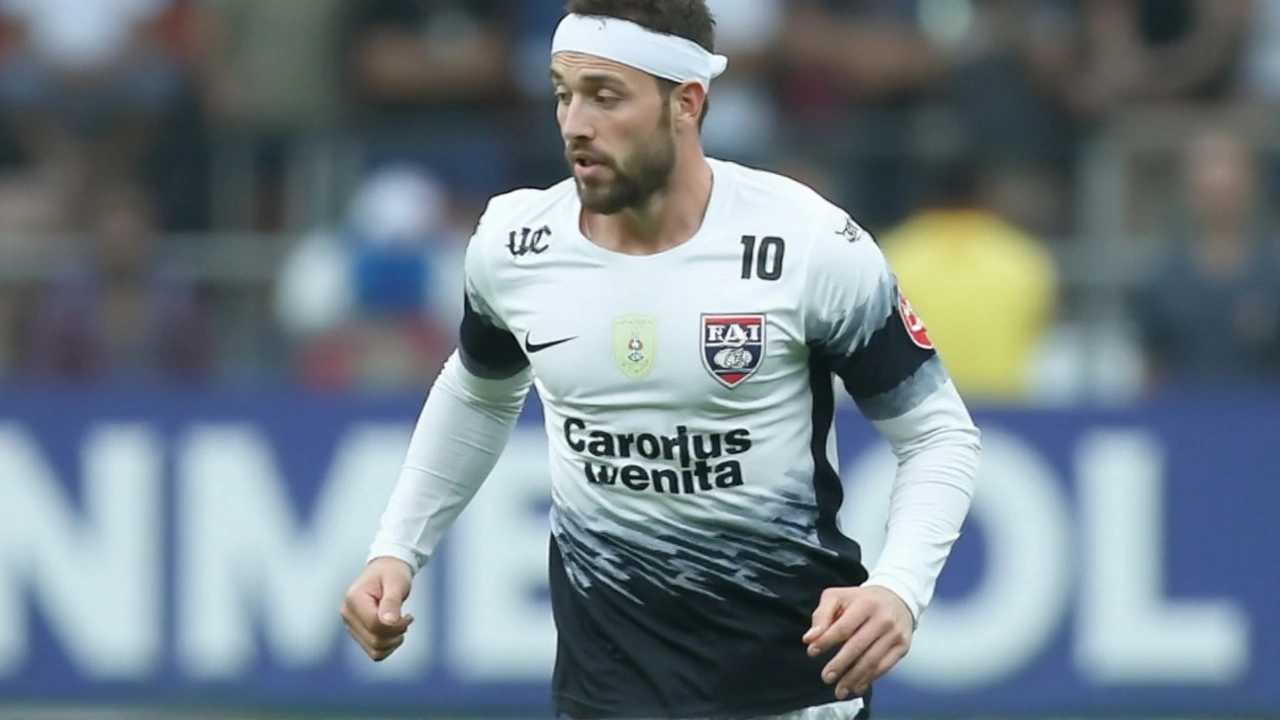A Colombian classic turns into a survival test
América de Cali are through to the group stage after a night that never settled down. They survived 90 minutes of swings and a nerve-shredding shootout to eliminate Junior in Barranquilla, 4-3 on penalties after a 2-2 draw that felt like three separate matches packed into one. In Colombia’s first-phase format for the Copa Sudamericana, it’s one game, win or go home. That pressure was stamped on every challenge, every set piece, every glance between the goalkeepers and takers.
The first half belonged to the visitors. América struck early and then doubled their lead before the break, punishing Junior with sharp transition play and cool finishing. An early spot-kick, awarded without delay by the referee, set the tone and rattled the home side. Junior’s back line looked flat-footed, the midfield slow to second balls. Barranquilla’s heat isn’t usually kind to visiting teams, but América looked fresher, quicker in their choices, and ruthless when the chance came.
Junior needed a spark and found it at half-time. The coach rolled the dice with Guillermo Paiva and Luis Gonzalez, and the energy changed instantly. The shape tilted forward, the tempo rose, and América’s back four suddenly had questions coming from both wings. Junior pressed higher, recovered balls earlier, and turned set pieces into real threats instead of hopeful deliveries.
Paiva grabbed the match by the collar. He first sliced the deficit to 2-1 with a confident finish that reawakened the Metropolitano crowd. Then came the equalizer: a textbook header from a Luis Gonzalez corner, powered through a forest of bodies with perfect timing and technique. It was the kind of goal that flips belief. The stands went from anxious to electric in a heartbeat.
América, to their credit, absorbed the storm. They tightened lines, slowed the pace when they could, and made measured changes from the bench. Their goalkeeper, Soto, exuded calm in chaotic moments, gathering crosses and buying precious seconds. Junior kept pushing, but the visitors’ compact shape and clear set-piece assignments blunted the worst of the danger.
There was no extra time in this phase—straight to penalties. That reality shaped the final minutes. Junior threw numbers forward when they could, but both teams seemed to balance ambition with the fear of a late mistake. When the whistle came, it felt less like an ending and more like the start of a new test of nerve.

The shootout: nerve, detail, and tiny margins
The goalkeepers met at midfield, the captains settled the coin toss, and the walk from the center circle felt longer with every step. Junior’s Santiago Mele tried the usual mind games—stares, slow walks, last-second movements on the line. América’s takers didn’t bite often enough for it to matter.
For América de Cali, the conversion list tells its own story: Quintero hammered his penalty with authority, Holgado stayed cool, Soto stepped up from goal to the spot and scored, and Rafael Carrascal closed the night with a right-footed strike into the top-right corner. Carrascal’s winner was clean and decisive, the kind of kick that leaves no room for debate. Cristian Barrios saw his attempt saved, the lone blemish in a run that otherwise screamed composure.
Junior lived the full rollercoaster. Luis Gonzalez found the corner with a clean strike, and Javier Báez tucked his into the bottom-right with control. But the breaks went against them when it mattered most. Paiva—hero of regular time—had his penalty saved down the middle, a gut-punch moment after his two-goal surge. Rodríguez also failed to convert, and with that second miss, the path to recovery narrowed to a tightrope.
The swing of emotion was brutal. Paiva had dragged Junior back into the match, only to see his shootout kick neutralized. It wasn’t a technical failure as much as a moment where the goalkeeper read the scene better. Soto held his ground, waited, and got the contact he wanted. Those are the inches that decide nights like this.
From open play to the spot, the match kept rewarding clarity. América managed the chaos better in the last half hour and then showed a steadier hand from 12 yards. Junior’s second-half resurgence was real—front-foot football, aggressive on crosses, and confident on corners—but it ran into a wall of good decisions by América in the key moments.
There were patterns worth bookmarking. Set pieces drove Junior back into the contest, with Gonzalez’s corner and Paiva’s header a quick-fire case study in timing and delivery. América’s responses came from structure—tight distances between lines, simple passes to release pressure, and a goalkeeper who chose the right gambles late on.
The officiating set an early edge with that quick penalty call, and from there, the match never really cooled. Both benches leaned on fresh legs to switch the rhythm. Junior’s changes accelerated the tempo; América’s stabilized it. If the first hour was a sprint followed by a stumble, the last half hour was chess with tackles.
What does it mean now? América de Cali move on to the group stage, where the rhythm shifts to travel, quick turnarounds, and the need for depth across multiple weeks. The financial bump of group play matters, but so does the confidence earned by surviving a night like this. The draw will decide how steep the next climb is, yet América won something more immediate in Barranquilla: belief in their late-game poise.
For Junior, the sting will linger. They had the crowd, the momentum, and the comeback narrative, and still walked away empty-handed. The upside is clear, though. The bench changed the game, Paiva looked like a match-winner in a big moment, and Gonzalez’s impact on set pieces gives them a tool they can lean on. Turning that into consistent league form becomes the next test.
Individual arcs stood out. Paiva’s brace showed a striker’s range—clinical feet for the first, aerial authority for the second. Gonzalez supplied the corner, then buried his penalty. Carrascal handled the heaviest kick of the night with calm. And Soto played both roles—scorer and stopper—like a goalkeeper who understands the psychology as much as the angles.
Zoom out and the format tells you why these nights feel different. Since the competition moved to single-match in-country pairings for this phase, the margin for error is razor thin. Two established Colombian sides collided for one ticket, and it never looked like anything other than a 50-50 decided by the tiniest details. América found just enough of those details to cross the line.
Scoreline snapshots rarely capture the whole thing, but 2-2 in regular time and 4-3 on penalties gets close. It was a game that flipped twice, survived on set pieces, and ended with a goalkeeper’s stare-down. Barranquilla will remember the noise. América will remember the feeling of a bus ride home where the songs sound a little louder.


Angela Arribas
August 21, 2025 AT 18:00The article forgets to mention the impact of altitude on players' stamina, which is a crucial factor in Colombian matches. Ignoring such details reduces the analysis to a shallow recap. Also, the phrase “swing of emotion was brutal” is vague and overused. 😒
Sienna Ficken
August 21, 2025 AT 20:13When you break down the match frame‑by‑frame, the underlying tactics are a mosaic of brilliance and blunder. The first half saw América exploiting transitional space with the precision of a Swiss watch, slipping through Junior’s midfield like a thief in a museum. Their early penalty, awarded faster than a coffee order in a downtown café, set the tempo and sent a subtle message: complacency would not be tolerated. Junior’s response at halftime resembled a phoenix rising from the ashes, with Paiva and González injecting a burst of kinetic energy that temporarily flipped the script. Paiva’s aerial swagger on the second goal was not just a header; it was a poetic declaration that gravity could be negotiated in the right moment. Yet the match’s true drama unfolded in the penalty shootout, where psychological warfare replaces physical duels. Soto’s decision to step up as a penalty taker was a masterstroke, demonstrating that goalkeepers can be more than mere shot‑stoppers-they can also be scorers of destiny. The missed penalty by Paiva, after his heroics, underscored the cruel irony that football loves to dish out, reminding everyone that yesterday’s hero can become today’s cautionary tale. Statistically, teams that concede first but rally to equalize have a 48 % success rate in shootouts, a figure that Junior unfortunately fell below. Moreover, the heat in Barranquilla acts as a silent referee, sapping stamina and accelerating mental fatigue, which likely contributed to the jittery nerve of the home side. From a coaching perspective, Junior’s substitution pattern-injecting fresh legs in the second half-was sound, but the lack of a defensive anchor in the final minutes left them exposed. América’s compact shape in the closing stages resembled a well‑engineered fortress, with the back four communicating almost telepathically to deny space. The officiating decision to award an early penalty arguably shifted momentum, a factor that analytics models often flag as a “game‑changing event.” Looking ahead, América’s group‑stage prospects will hinge on their ability to replicate this composure under pressure, a skill that transcends pure technical ability. In short, the night was a textbook case of how minute details-set‑piece timing, goalkeeper psychology, and even weather conditions-can sway a knockout encounter dramatically.
Zac Death
August 21, 2025 AT 21:36Reading that breakdown reminds us why the beautiful game feels like a never‑ending rollercoaster. The way América kept their cool shows that mental strength can outshine raw talent, and Junior’s comeback spark proves that momentum can flip in a heartbeat. Fans love those swings because they remind us that nothing is set in stone until the final whistle blows. Keep supporting your sides, stay passionate, and remember that every match is a lesson in resilience.
Lizzie Fournier
August 21, 2025 AT 23:00Both teams gave us a night worth remembering.
JAN SAE
August 22, 2025 AT 00:23That sentiment captures the essence of why we watch, and it’s a reminder to young players: work hard, stay humble, and never underestimate the power of a single decisive moment, especially in a shootout; the margins are razor‑thin, the pressure is immense, and perseverance often decides the outcome.